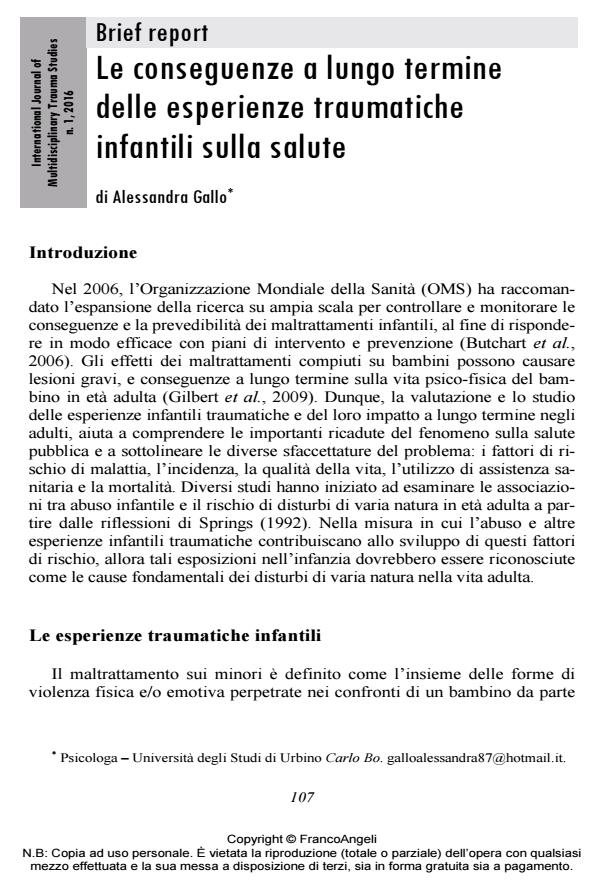Le conseguenze a lungo termine delle esperienze traumatiche infantili sulla salute
Titolo Rivista INTERNATIONAL JOURNAL OF MULTIDISCIPLINARY TRAUMA STUDIES
Autori/Curatori Alessandra Gallo
Anno di pubblicazione 2016 Fascicolo 2016/1 Lingua Italiano
Numero pagine 6 P. 107-112 Dimensione file 162 KB
DOI 10.3280/IJM2016-001011
Il DOI è il codice a barre della proprietà intellettuale: per saperne di più
clicca qui
Qui sotto puoi vedere in anteprima la prima pagina di questo articolo.
Se questo articolo ti interessa, lo puoi acquistare (e scaricare in formato pdf) seguendo le facili indicazioni per acquistare il download credit. Acquista Download Credits per scaricare questo Articolo in formato PDF

FrancoAngeli è membro della Publishers International Linking Association, Inc (PILA)associazione indipendente e non profit per facilitare (attraverso i servizi tecnologici implementati da CrossRef.org) l’accesso degli studiosi ai contenuti digitali nelle pubblicazioni professionali e scientifiche
L’importanza degli eventi di vita nei confronti della salute ha sempre avuto riconoscimento in medicina e la scoperta di una possibile influenza di problematiche psicologiche sul sistema immunitario ha evidenziato l’implicazione di quest’ultimo in gran parte delle patologie: dalle malattie infettive alle malattie autoimmuni, ai tumori. La letteratura recente afferma come le relazioni infantili caratterizzate abitualmente da gravi maltrattamenti, abusi o trascuratezza emotiva (neglect), influenzino in maniera stabile lo sviluppo del bambino rendendolo vulnerabile, in età adulta, a una serie di disturbi. A tal proposito, molte ricerche hanno indagato e confermato gli effetti a lungo-termine delle esperienze traumatiche infantili sul possibile sviluppo di sintomi psicosomatici, malattie cardiovascolari, obesità e cancro. Più precisamente, si è osservata una correlazione tra il numero di episodi traumatici e il rischio di sviluppare patologie. I risultati, infatti, suggeriscono che dato l’impatto forte e cumulativo di queste esperienze, sullo stato di salute degli adulti, è auspicabile una maggiore attenzione alle strategie di prevenzione primaria, secondaria e terziaria. Tali strategie comprendono la prevenzione del verificarsi di esperienze avverse durante l’infanzia e l’adolescenza, un lavoro efficace sulle situazioni a rischio e infine il miglioramento del carico di malattia.;
Keywords:Neglect, malattie psicosomatiche, prevenzione.
- Andrews G., Corry J., Slade T., Issakidis C. and Swanston H. (2004). Child sexual abuse. In: Ezzati M., Lopez A.D., Rodgers A., Murray C.J.L. (Eds.), Comparative quantification of health risks: global and regional burden of disease attributable to selected major risk factors. Geneva: World Health Organization.
- Arias I. (2004). The legacy of child maltreatment: long-term health consequences for women. J Womens Health, 13(5):468–73.
- Butchart A., Kahane T., Phinney H.A., Mian M. and Furniss T. (2006). Preventing child maltreatment: a guide to taking action and generating evidence. Geneva: WHO and International Society for the Prevention of Child Abuse and Neglect.
- Desai S., Arias I., Thompson M.P. and Basile K.C. (2002). Childhood victimization and subsequent adult revictimization assessed in a nationally representative sample of women and men. Violence Vict, 17(6):639–53.
- Dong M., Giles W.H., Felitti V.J., Dube S.R., Williams J.E., Chapman D.P. and Anda R.F. (2004). Insights into causal pathways for ischemic heart disease: adverse childhood experiences. Circulation, 110(13):1761–6.
- Emalee G., Flaherty M.D., Thompson R., Litrownik A.J., Zolotor A.J., Dubowitz H., Runya D.K., English D.J. and Everson M.D. (2009). Adverse Childhood Exposures and Reported Child Health at Age 12. Academic Pediatric Association, 9(3):150-6. DOI: 10.1016/j.acap.2008.11.003.
- Felitti V.J., Anda R.F., Nordenberg D., Williamson D.F., Spitz A.M., Edwards V., Koss M.P. and Marks J.S. (1998). Relationship of Childhood Abuse and Household Dysfunction to Many of the Leading Causes of Death in Adults. The Adverse Childhood Expernences (ACE) Study. American Journal of Preventive Medicine, 14(4):245-58.
- Gilbert R., Widom C.S., Browne K., Fergusson D., Webb E. and Janson S. (2009). Burden and consequences of child maltreatment in high-income countries. Lancet, 373(9657):68–81. DOI: 10.1016/S0140-6736(08)61706-7
- Goodwin R.D. and Stein M.B. (2004). Association between childhood trauma and physical disorders among adults in the US. Psychol Med, 34(3):509–20.
- Krug E.G., Dahlberg L.L., Mercy J.A., Zwi A. and Lozano R. (2002). World report on violence and health. Geneva: World Health Organization.
- Leeb R.T., Paulozzi L., Melanson C., Simon T. and Arias I. (2008). Child maltreatment surveillance. Uniform definitions for public health and recommended data elements. Atlanta: Centers for Disease Control and Prevention.
- Noll J.G., Zeller M.H., Trickett P.K. and Putnam F.W. (2007). Obesity risk for female victims of childhood sexual abuse: a prospective study. Pediatrics, 120(1):e61–7.
- Norman R.E., Byambaa M., De R., Butchart A., Scott J. and Vos T. (2012). The Long-Term Health Consequences of Child Physical Abuse, Emotional Abuse, and Neglect: A Systematic Review and Meta-Analysis. PLOS Medicine, 9 (11):1-31. DOI. 10.1371/journal.pmed.1001349.
- Pinheiro P.S. (2006). World report on violence against children. New York (US): United Nations.
- Pretty C., O’Leary D.D., Cairney J. and Wade T.J. (2013). Adverse childhood experience and cardiovascular health of children: a cross-sectional study. BMC Pediatr, 13:208. DOI: 10.1186/1471-2431-13-208
- Runyan D., Wattam C., Ikeda R., Hassan F. and Ramiro L. (2002). Child abuse and neglect by parents and other caregivers. In: Krug E.G., Dahlberg L.L., Mercy J.A., Zwi A.B. and Lozano R. (Eds.), World report on violence and health. Geneva: World Health Organization.
- Springs F. and Friedrich W.N. (1992). Health risk behaviors and medical sequelae of childhood sexual abuse. Mayo Clin Proc, 67(6):527–32.
- Stein D.J., Scott K., Haro Abad J.M., Aguilar-Gaxiola S., Alonso J., Angermeyer M., Demytteneare K., De Girolamo G., Iwata N., Posada-Villa J., Kovess V., Lara C., Ormel J., Kessler R.C. and Von Korff M. (2010). Early childhood adversity and later hypertension: data from the World Mental Health Survey. Ann Clin Psychiatry, 22(1):19–28.
Alessandra Gallo, Le conseguenze a lungo termine delle esperienze traumatiche infantili sulla salute in "INTERNATIONAL JOURNAL OF MULTIDISCIPLINARY TRAUMA STUDIES" 1/2016, pp 107-112, DOI: 10.3280/IJM2016-001011